- Home
- Michael Ondaatje
Running in the Family Page 6
Running in the Family Read online
Page 6
The snakes also had the habit of coming into the house and at least once a month there would be shrieks, the family would run around, the shotgun would be pulled out, and the snake would be blasted to pieces. Certain sections of the walls and floors showed the scars of shot. My stepmother found one coiled asleep on her desk and was unable to approach the drawer to get the key to open the gun case. At another time one lay sleeping on the large radio to draw its warmth and, as nobody wanted to destroy the one source of music in the house, this one was watched carefully but left alone.
Most times though there would be running footsteps, yells of fear and excitement, everybody trying to quiet everybody else, and my father or stepmother would blast away not caring what was in the background, a wall, good ebony, a sofa, or a decanter. They killed at least thirty snakes between them.
After my father died, a grey cobra came into the house. My stepmother loaded the gun and fired at point blank range. The gun jammed. She stepped back and reloaded but by then the snake had slid out into the garden. For the next month this snake would often come into the house and each time the gun would misfire or jam, or my stepmother would miss at absurdly short range. The snake attacked no one and had a tendency to follow my younger sister Susan around. Other snakes entering the house were killed by the shotgun, lifted with a long stick and flicked into the bushes, but the old grey cobra led a charmed life. Finally one of the old workers at Rock Hill told my stepmother what had become obvious, that it was my father who had come to protect his family. And in fact, whether it was because the chicken farm closed down or because of my father’s presence in the form of a snake, very few other snakes came into the house again.
* * *
The last incident at Rock Hill took place in 1971, a year before the farm was sold. 1971 was the year of the Insurgence. The rebels against the government consisted of thousands from every walk of life—but essentially the young. The age of an insurgent ranged from fifteen to twenty. They were a strange mixture of innocence and determination and anarchy, making home-made bombs with nails and scraps of metal and at the same time delighted and proud of their uniforms of blue trousers with a stripe down the side, and tennis shoes. Some had never worn tennis shoes before. My cousin Rhunie was staying at the Ambepussa resthouse with the Chitrasena dance troupe when fifty insurgents marched up the road in formation chanting “we are hungry we are hungry,” ransacked the place for food, but did not touch any one there because they were all fans of the dance company.
The insurgents were remarkably well organized and general belief is that they would have taken over the country if one group hadn’t mixed up the dates and attacked the police station in Wellawaya a day too soon. The following day every police station and every army barrack and every radio station was to be hit simultaneously. Some gangs hid out in the jungle reserves at Wilpattu and Yala where they survived by shooting and eating the wildlife. A week before the uprising they had broken into local government offices, gone through the files and found the location of every registered weapon in the country. The day after the revolt broke out, a gang of twenty marched from house to house in Kegalle collecting weapons and finally came up the hill to Rock Hill.
They had ransacked several houses already, stripping them of everything—food, utensils, radios and clothing, but this group of 17-year-olds was extremely courteous to my stepmother and her children. My father had apparently donated several acres of Rock Hill towards a playground several years earlier and many of these insurgents had known him well.
They asked for whatever weapons the house had and my stepmother handed over the notorious shotgun. They checked their files and saw a rifle was also listed. It turned out to be an air rifle, wrongly categorized. I had used it often as a ten-year-old, ankle deep in paddy fields, shooting at birds, and if there were no birds, at the fruit of trees. While all this official business was going on around the front porch, the rest of the insurgents had put down their huge collection of weapons, collected from all over Kegalle, and persuaded my younger sister Susan to provide a bat and a tennis ball. Asking her to join them, they proceeded to play a game of cricket on the front lawn. They played for most of the afternoon.
ECLIPSE PLUMAGE
LUNCH CONVERSATION
Wait a minute, wait a minute! When did all this happen, I’m trying to get it straight …
Your mother was nine, Hilden was there, and your grandmother Lalla and David Grenier and his wife Dickie.
How old was Hilden?
Oh, in his early twenties.
But Hilden was having dinner with my mother and you.
Yes, says Barbara. And Trevor de Saram. And Hilden and your mother and I were quite drunk. It was a wedding lunch, Babette’s I think, I can’t remember all those weddings. I know Hilden was moving with a rotten crowd of drinkers then so he was drunk quite early and we were all laughing about the drowning of David Grenier.
I didn’t say a word.
Laughing at Lalla, because Lalla nearly drowned too. You see, she was caught in a current and instead of fighting it she just relaxed and went with it out to sea and eventually came back in a semi-circle. Claimed she passed ships.
And then Trevor got up in a temper and challenged Hilden to a duel. He couldn’t stand everyone laughing, and Hilden and Doris (your mother) being drunk, two of them flirting away he thought.
But why?, your mother asked Trevor.
Because he is casting aspersions on you …
Nonsense, I love aspersions. And everyone laughed and Trevor stood there in a rage.
And then, said Barbara, I realized that Trevor had been in love with your mother, your father always said there was a secret admirer. Trevor couldn’t stand Hilden and her having a good time in front of him.
Nonsense, said your mother. It would have been incest. And besides (watching Hilden and Trevor and aware of the fascinated dinner table audience), both these men are after my old age pension.
What happened, said Hilden, was that I drew a line around Doris in the sand. A circle. And threatened her, “don’t you dare step out of that circle or I’ll thrash you.”
Wait a minute, wait a minute, when is this happening?
Your mother is nine years old, Hilden says. And out in the sea near Negombo David Grenier is drowning. I didn’t want her to go out.
You were in love with a nine year old?
Neither Hilden nor Trevor were ever in love with our mother, Gillian whispers to me. People always get that way at weddings, always remembering the past in a sentimental way, pretending great secret passions which went unsaid …
No No No. Trevor was in love with your mother.
Rot!
I was in my twenties, Hilden chimes in. Your mother was nine. I simply didn’t want her going into the water while we tried to rescue David Grenier. Dickie, his wife, had fainted. Lalla—your mother’s mother—was caught in the current and out at sea, I was on the shore with Trevor.
Trevor was there too you see.
Who is Hilden? asks Tory.
I am Hilden … your host! Oh.
Anyway … there seems to be three different stories that you’re telling.
No, one, everybody says laughing.
One when your mother was nine. Then when she was sixty-five and drinking at the wedding lunch, and obviously there is a period of unrequited love suffered by the silent Trevor who never stated his love but always fought with anyone he thought was insulting your mother, even if in truth she was simply having a good time with them the way she was with Hilden, when she was sixty-five.
Good God, I was there with them both, says Barbara, and I’m married to Hilden.
So where is my grandmother?
She is now out at sea while Hilden dramatically draws a circle round your mother and says “Don’t you dare step out of that!” Your mother watches David Grenier drowning. Grenier’s wife—who is going to marry three more times including one man who went crazy—is lying in the sand having fainted. And your mother can see t
he bob of her mother’s head in the waves now and then. Hilden and Trevor are trying to retrieve David Grenier’s body, carefully, so as not to get caught in the current themselves.
My mother is nine.
Your mother is nine. And this takes place in Negombo.
OK
So an hour later my grandmother, Lalla, comes back and entertains everyone with stories of how she passed ships out there and they tell her David Grenier is dead. And nobody wants to break the news to his wife Dickie. Nobody could. And Lalla says, alright, she will, for Dickie is her sister. And she went and sat with Dickie who was still in a faint in the sand, and Lalla, wearing her elaborate bathing suit, held her hand. Don’t shock her, says Trevor, whatever you do break it to her gently. My grandmother waves him away and for fifteen minutes she sits alone with her sister, waiting for her to waken. She doesn’t know what to say. She is also suddenly very tired. She hates hurting anybody.
The two men, Hilden and Trevor, will walk with her daughter, my mother, about a hundred yards away down the beach, keeping their distance, waiting until they see Dickie sitting up. And then they will walk slowly back towards Dickie and my grandmother and give their sympathies.
Dickie stirs. Lalla is holding her hand. She looks up and the first words are, “How is David? Is he alright?” “Quite well, darling,” Lalla says. “He is in the next room having a cup of tea.”
AUNTS
How I have used them.… They knit the story together, each memory a wild thread in the sarong. They lead me through their dark rooms crowded with various kinds of furniture—teak, rattan, calamander, bamboo—their voices whispering over tea, cigarettes, distracting me from the tale with their long bony arms, which move over the table like the stretched feet of storks. I would love to photograph this. The thin muscle on the upper arms, the bones and veins at the wrist that almost become part of the discreet bangle, all disappearing into the river of bright sari or faded cotton print.
My aunt Dolly stands five foot tall, weighing seventy pounds. She has not stopped smoking since the age of fifteen and her 80-year-old brain leaps like a spark plug bringing this year that year to life. Always repeating the last three words of your question and then turning a surprising corner on her own. In the large house whose wings are now disintegrating into garden and bush she moves frail as Miss Havisham. From outside the house seems incapable of use. I climb in through the window that frames her and she greets me with “I never thought I’d see you again,” and suddenly all these journeys are worth it, just to be able to hug this thin woman who throws her cane onto the table in order to embrace me.
She and her brother Arthur were my father’s close friends all his life. He knew that, whatever he had done, Arthur would be there to talk him out of madness, weakness, aloneness. They introduced most of the children of our generation to the theatre, dressing us up in costumes for The Mikado, A Midsummer Night’s Dream—all of which Dolly made herself. Although her family was not excessive in their affairs, they shielded anyone who was in the midst of a passion. “Affairs were going on all around us, even when we were children … so we were well trained.”
Today is one of Dolly’s deaf days but the conversation rolls with the pure joy of the meeting. “Oh I looked after you several times when you were in Boralesgamuwa, do you remember?” “Yes, yes.” “WHAT?” “Yes.” The frailty does not stop her stories though she pauses now and then to say, “God if you quote me I’m dead. I’ll be caught for libel and killed.… You see they liked their flirtations. All the wives met their beaux in the Cinnamon Gardens, that’s where they went to flirt, then they’d come here and use us as an alibi. Your grandmother Lalla for instance had lots of relationships. We could never keep up with her. We almost had to write the names down to remember who she was seeing. My advice you see is to get on with everybody—no matter what they do.”
The conversation is continually halted by a man lying just below the ceiling hammering nails into it—hoping to keep it propped up for a few more years. Outside loud chickens fill in the spaces between Dolly’s words. Eyes squint in the smoke. “I wish I could see you properly but my glasses are being fixed this week.”
As I prepare to leave she walks with me, half deaf and blind, under several ladders in her living room that balance paint and workmen, into the garden where there is a wild horse, a 1930 car splayed flat on its axles and hundreds of flowering bushes so that her eyes swim out into the dark green and unfocussed purple. There is very little now that separates the house from the garden. Rain and vines and chickens move into the building. Before I leave, she points to a group photograph of a fancy dress party that shows herself and my grandmother Lalla among the crowd. She has looked at it for years and has in this way memorized everyone’s place in the picture. She reels off names and laughs at the facial expressions she can no longer see. It has moved tangible, palpable, into her brain, the way memory invades the present in those who are old, the way gardens invade houses here, the way her tiny body steps into mine as intimate as anything I have witnessed and I have to force myself to be gentle with this frailty in the midst of my embrace.
THE PASSIONS OF LALLA
My Grandmother died in the blue arms of a jacaranda tree. She could read thunder.
She claimed to have been born outdoors, abruptly, during a picnic, though there is little evidence for this. Her father—who came from a subdued line of Keyts—had thrown caution to the winds and married a Dickman. The bloodline was considered eccentric (one Dickman had set herself on fire) and rumours about the family often percolated across Colombo in hushed tones. “People who married the Dickmans were afraid.”
There is no information about Lalla growing up. Perhaps she was a shy child, for those who are magical break from silent structures after years of chrysalis. By the time she was twenty she was living in Colombo and tentatively engaged to Shelton de Saram—a very good looking and utterly selfish man. He desired the good life, and when Frieda Donhorst arrived from England “with a thin English varnish and the Donhorst checkbook” he promptly married her. Lalla was heartbroken. She went into fits of rage, threw herself on and pounded various beds belonging to her immediate family, and quickly married Willie Gratiaen—a champion cricketer—on the rebound.
Willie was also a broker, and being one of the first Ceylonese to work for the English firm of E. John and Co. brought them most of their local business. The married couple bought a large house called “Palm Lodge” in the heart of Colombo and here, in the three acres that came with the house, they began a dairy. The dairy was Willie’s second attempt at raising livestock. Fond of eggs, he had decided earlier to import and raise a breed of black chicken from Australia. At great expense the prize Australorp eggs arrived by ship, ready for hatching, but Lalla accidentally cooked them all while preparing for a dinner party.
Shortly after Willie began the dairy he fell seriously ill. Lalla, unable to cope, would run into neighbours’ homes, pound on their beds, and promise to become a Catholic if Willie recovered. He never did and Lalla was left to bring up their two children.
She was not yet thirty, and for the next few years her closest friend was her neighbour, Rene de Saram, who also ran a dairy. Rene’s husband disliked Lalla and disliked his wife’s chickens. Lalla and the chickens would wake him before dawn every morning, especially Lalla with her loud laughter filtering across the garden as she organized the milkers. One morning Rene woke to silence and, stepping into the garden, discovered her husband tying the beaks of all the chickens with little pieces of string, or in some cases with rubber bands. She protested, but he prevailed and soon they saw their chickens perform a dance of death, dying of exhaustion and hunger, a few managing to escape along Inner Flower Road, some kidnapped by a furious Lalla in the folds of her large brown dress and taken to Palm Lodge where she had them cooked. A year later the husband lapsed into total silence and the only sounds which could be heard from his quarters were barkings and later on the cluck of hens. It is believed he was the victim
of someone’s charm. For several weeks he clucked, barked, and chirped, tearing his feather pillows into snowstorms, scratching at the expensive parquet floors, leaping from first-storey windows onto the lawn. After he shot himself, Rene was left at the age of thirty-two to bring up their children. So both Rene and Lalla, after years of excessive high living, were to have difficult times—surviving on their wits and character and beauty. Both widows became the focus of the attention of numerous bored husbands. Neither of them was to marry again.
Each had thirty-five cows. Milking began at four-thirty in the morning and by six their milkmen would be cycling all over town to deliver fresh milk to customers. Lalla and Rene took the law into their own hands whenever necessary. When one of their cows caught Rinderpest Fever—a disease which could make government officials close down a dairy for months—Rene took the army pistol which had already killed her husband and personally shot it dead. With Lalla’s help she burnt it and buried it in her garden. The milk went out that morning as usual, the tin vessels clanking against the handlebars of several bicycles.
Lalla’s head milkman at this time was named Brumphy, and when a Scot named McKay made a pass at a servant girl Brumphy stabbed him to death. By the time the police arrived Lalla had hidden him in one of her sheds, and when they came back a second time she had taken Brumphy over to a neighbour named Lillian Bevan. For some reason Mrs. Bevan approved of everything Lalla did. She was sick when Lalla stormed in to hide Brumphy under the bed whose counterpane had wide lace edges that came down to the floor. Lalla explained that it was only a minor crime; when the police came to the Bevan household and described the brutal stabbing in graphic detail Lillian was terrified as the murderer was just a few feet away from her. But she could never disappoint Lalla and kept quiet. The police watched the house for two days and Lillian dutifully halved her meals and passed a share under the bed. “I’m proud of you darling!” said Lalla when she eventually spirited Brumphy away to another location.

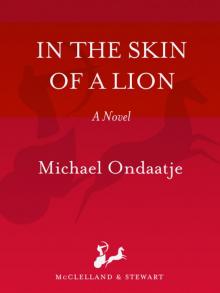 In the Skin of a Lion
In the Skin of a Lion The Cinnamon Peeler
The Cinnamon Peeler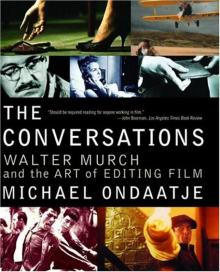 The Conversations: Walter Murch and the Art of Editing Film
The Conversations: Walter Murch and the Art of Editing Film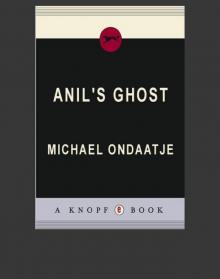 Anil's Ghost
Anil's Ghost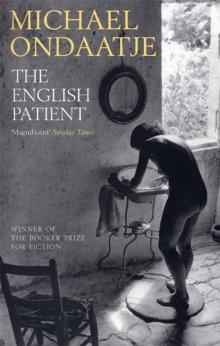 The English Patient
The English Patient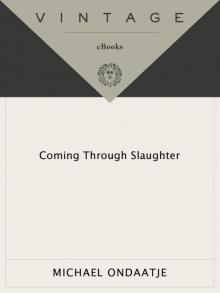 Coming Through Slaughter
Coming Through Slaughter Handwriting
Handwriting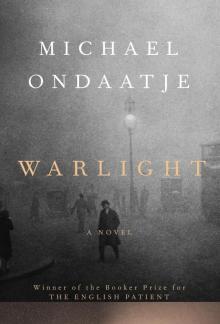 Warlight
Warlight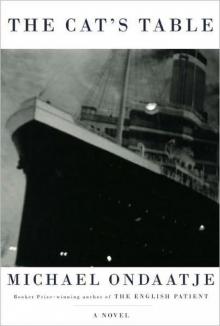 The Cat's Table
The Cat's Table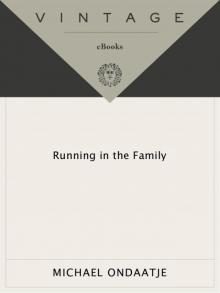 Running in the Family
Running in the Family The Collected Works of Billy the Kid
The Collected Works of Billy the Kid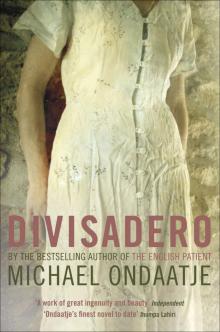 Divisadero
Divisadero